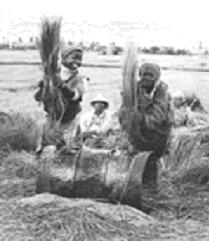
Posted by Lova Rakotomalala to Global Voices Online
21 farmers from the locality of Ankorondrano-Analavory (90 km west of Antananarivo, Madagascar) were sentenced by the state court of Miarinarivo to various sentences because of a collective act of rebellion that stemmed from a dispute over land ownership. To protest the expropriation of lands that they believe was theirs for decades, farmers fought with police forces that came to evict them from the disputed land. The scuffle resulted in the deaths of 2 policemen and 1 woman from the community.
The ruling came out 8 months ago but an increased online campaign for clemency for the farmers put the story back into public awareness. Polarized conversations about the verdicts are taking places on online forums and blogs.

(Photo credit L’Express de Madagascar)
Before reporting the different viewpoints, a brief background on the legal implications of the dispute and sentences is necessary.
According to L’Express de Madagascar, The legal rights to the 172 ha of land belongs to a promoter who acquired the land for a development project (unconfirmed sources mentioned the construction of an amusement park). However, the farmers have been effectively growing crops on the land since the 70’s when the legal ownership of the land were not clearly defined.
The 21 farmers were sentenced as follows: 12 received death penalties, 6 to 12 years were sentenced to forced labor, one farmer received one year of imprisonment and another one year on probation.
 (
(
(Photo credit to AFASPA)
A netizen, Raharimbahoaka Andriahobijaona, explains on the facebook page advocating clemency for the farmers that Madagascar is one of the nations that signed the pact to abolish death penalty (instituted in 1958 in Madagascar) so even though death penalty has not been removed from the constitution yet, all the 53 death penalty sentences pronounced to this day have all been effectively “transformed” into life sentences. He goes on arguing (fr):
“ devant la justice, vu les faits et les preuves, les riches ont presque toujours gain de cause. La justice n’est pas mal faite, mais certaines lois sont dépassées et ne correspondent plus au monde actuel.[..]Le vrai problème est que le foncier dans la tradition malgache reste un héritage culturel.”
In front of the court of justice, given the facts and evidences, wealthy people will always eventually win their case. The judicial system is not all at fault here, it’s just a few laws that are obsolete and do not correspond to the reality of the current world. The main issue in Madagascar is that real estate is still rooted in the tradition of cultural inheritance [inadequate in the globalization trends]
He also adds:
“Utiliser la presse étrangère, la diaspora malgache et tous les médias dont on disposent est, je pense, très utile. Car à notre ère, la présidence suit de très près ce qui se passe au pays et ailleurs. Ce qui compte c’est la manière et la façon dont on s’y prend pour agir. Nous devons respecter la loi en vigueur tout en négociant pour pouvoir trouver ce qu’il convient de faire sur le moment.”
I believe that utilizing foreign media, the Malagasy diaspora and all other media avenues can be effective. In this era, the presidency is following closely what is being said in the country and overseas. What matters is the way that we would go about acting [on behalf of the farmers]. We must respect the current legal system while negotiating what is best [for the farmers] at the moment.
A petition to free the farmers has been issued and formally presented to the president Marc Ravalomanana and the minister of Justice Bakolalao Ramanandraibe Ranaivoharivony by the French Association for friendship and solidarity with the African People (AFASPA).
Supporters of the liberation of the Malagasy farmers voiced their outrage at the sentencing especially considering the complex history of real estate inheritance in that region. Jean Razafindambo explains that the colonization period induced a lot of confusion regarding actual ownership of land. He offers the following solution (fr):
“Le dialogue ne devrait-il pas toujours primer sur la répression dans un litige foncier? [..]L’Etat de Madagascar devrait racheter ces hypothèques à leurs justes valeurs actuelles et effectuer une réforme agraire en bonne et due forme qui tient compte des facteurs historiques et non juste des archives héritées de la colonization”
Shouldn’t a dialog always be attempted before one moves on to aggressive repression when it comes to real estate dispute? […] The State of Madagascar should purchase back all the mortgage at their current values and implement an agricultural reform that takes into account historical factors and not just real estate archives inherited from the colonization period.

Leave Your Comments